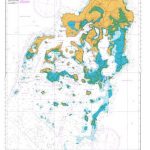Disclosure : This site contains affiliate links to products. We may receive a commission for purchases made through these links.
Flying Carpet
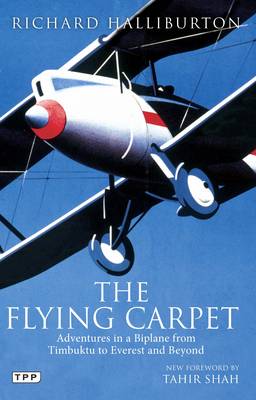
`I`ve just given myself an airplane and I want you to fly us to all the outlandish places in the world, Turkey, Persia, Paris and – Pasadena. We`re going to fly across deserts, over mountains, rescue imprisoned princesses and fight dragons. We must have the world. We can have the world!` Thirsting for a new adventure and announcing that `an adventure not in the air is obsolete`, Richard Halliburton hired pioneer aviator Moye Stephens in 1931 and fearlessly set out to circle the world in an open cockpit biplane optimistically named The Flying Carpet. For Halliburton it was the ultimate in romantic, risky exploration and was a means of seeing the world in a way that few had ever seen it before. True to form, his journey was breathtakingly audacious. They performed aerobatics in Fez, landed in mysterious Timbuktu, spent time with the French Foreign Legion in Algeria and explored Cairo, Damascus and Petra. In Iran, they met legendary aviatrix Ella Beinhorn and gave Princess Mahin Banu a ride. In Iraq, it was the turn of King Faisal`s young son, Ghazi, who was escorted by two RAF fighter planes.In India, they flew over the Taj Mahal – upside down – and, soaring over the Himalayas, Halliburton took the first aerial photograph of Everest. In Borneo they were entertained by Sylvia Brooke, the `White Queen of Borneo`, and by the chief of the Iban Dyak headhunters, who gave them dozens of shrunken heads. A journey as dazzling as Halliburton himself and, with the world at war less than a decade later, marking the end of an era, the story of The Flying Carpet is as captivating today as it was to the world 80 years ago.
Related Products:
 Three Kings in Baghdad
Three Kings in Baghdad
 The Big Book of Planes: Discover the Biggest, Fastest and Best Flying Machines
The Big Book of Planes: Discover the Biggest, Fastest and Best Flying Machines
 The Flying Boat That Fell to Earth: A Lost World of Air Travel and Africa
The Flying Boat That Fell to Earth: A Lost World of Air Travel and Africa
 Stephen Biesty`s Flying Machines
Stephen Biesty`s Flying Machines
 The Carpet People
The Carpet People
 The Flying Machine Kit: Make 5 Planes!
The Flying Machine Kit: Make 5 Planes!
 Flying With The Larks
Flying With The Larks
 Asterix and the Magic Carpet
Asterix and the Magic Carpet
 A Carpet Ride to Khiva
A Carpet Ride to Khiva
 Those Magnificent Sheep in Their Flying Machine
Those Magnificent Sheep in Their Flying Machine
 Teach Yourself to Fly: The Classic Guide to Flying a Plane
Teach Yourself to Fly: The Classic Guide to Flying a Plane
 The Lying Carpet
The Lying Carpet
 The Flying Bath
The Flying Bath
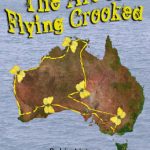 The Art of Flying Crooked
The Art of Flying Crooked
 The Flying Scotsman: The World`s Most Famous Train
The Flying Scotsman: The World`s Most Famous Train
 The Flying Scotsman: The Train, the Locomotive, the Legend
The Flying Scotsman: The Train, the Locomotive, the Legend
 The Phoenix and the Carpet
The Phoenix and the Carpet
 Flying with Confidence
Flying with Confidence
 Flying Fergus 1: The Best Birthday Bike
Flying Fergus 1: The Best Birthday Bike
 Zog and the Flying Doctors
Zog and the Flying Doctors
 The Fantastic Flying Books of Mr Morris Lessmore
The Fantastic Flying Books of Mr Morris Lessmore
 The Complete Book of Australian Flying Doctor Stories
The Complete Book of Australian Flying Doctor Stories
 Xmas Flying Ladies & Tree
Xmas Flying Ladies & Tree
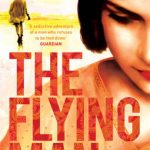 The Flying Man
The Flying Man
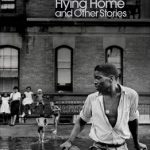 Flying Home and Other Stories
Flying Home and Other Stories
 Belvedere: In volo sulla Toscana – Flying above Tuscany
Belvedere: In volo sulla Toscana – Flying above Tuscany
 Planes and Rockets and Things That Fly
Planes and Rockets and Things That Fly
 The Marvels of Flying: Air Travel Before 1950
The Marvels of Flying: Air Travel Before 1950
 Flying Fergus 2: The Great Cycle Challenge
Flying Fergus 2: The Great Cycle Challenge
 Franklin`s Flying Bookshop
Franklin`s Flying Bookshop
 Keep the Aspidistra Flying
Keep the Aspidistra Flying
 A Journey Through Art: A Global History
A Journey Through Art: A Global History
 Flying the Nest: The Early Days of Britain`s Best-Loved Animals
Flying the Nest: The Early Days of Britain`s Best-Loved Animals
 How to Fly a Battle of Britain Fighter: Spitfire, Messerschmitt, Hurricane
How to Fly a Battle of Britain Fighter: Spitfire, Messerschmitt, Hurricane
 Admiral Hornblower: Flying Colours, The Commodore, Lord Hornblower, Hornblower in the West Indies
Admiral Hornblower: Flying Colours, The Commodore, Lord Hornblower, Hornblower in the West Indies
 Journey
Journey
 Where Hornbills Fly: A Journey with the Headhunters of Borneo
Where Hornbills Fly: A Journey with the Headhunters of Borneo
 Into the Heart of Borneo
Into the Heart of Borneo
 Stanfords Gift Card – Flying Child
Stanfords Gift Card – Flying Child
 Flying Rabbits, Singing Squirrels and Other Bedtime Stories
Flying Rabbits, Singing Squirrels and Other Bedtime Stories











